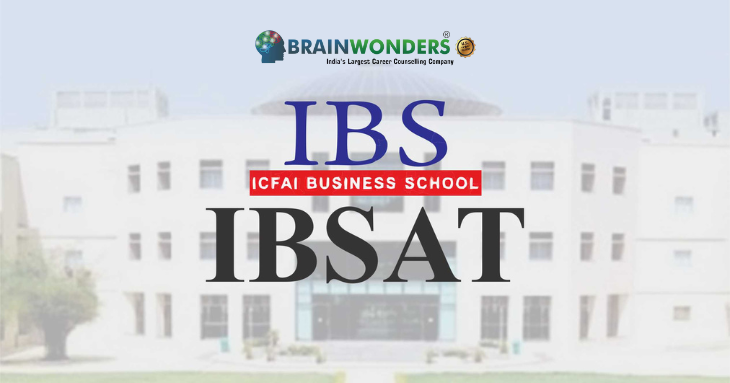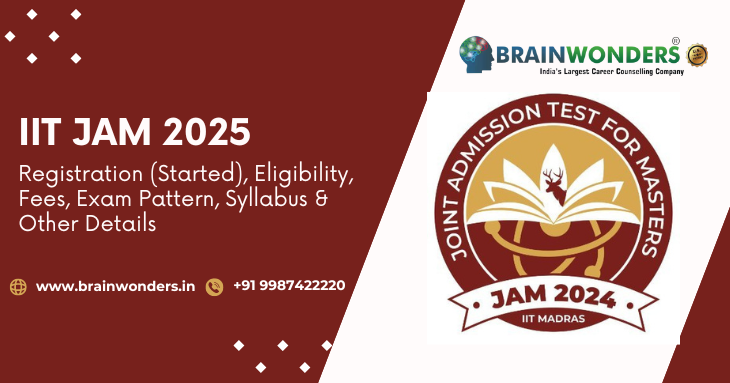

Take Brainwonders Career Test and make the right decisions for your college and course ahead
Let your unique personality, strengths, and traits guide to make the best decdision of your life!
Blog
07 February,2024 | By Brainwonders
_Degree_-_Courses,_Admission,_Colleges,_Subjects,_Fees.png)
MA full form is Master of Arts, it is a 2-year postgraduate course which helps students gain immense theoretical and practical knowledge in areas like History, Journalism, Public Administration, Politics, Psychology, etc. Thus, the MA course is specially designed for students interested in continuing their studies by pursuing the postgraduate course.
Master of Arts or MA is a specialised course that helps students incorporate and excel in different humanities, arts and social sciences areas. Students can pursue an MA course either full-time or in distance mode.
Distance MA helps individuals who are already involved in a job or pursuing a different course. Various universities have started offering distance learning MA courses for working individuals or those involved in their studies.
| MA full form | Master of Arts |
| Degree | Masters or Postgraduate |
| Duration | Two years |
| Course Types | Regular and Distance |
| Specialisations |
|
| Average MA Starting Salary | Up to Rs. 4 LPA |
| Average MA Cost | INR 10,000 – INR 1,00,000 |
As we all know, completing the BA is not enough; to bring you various employment opportunities, you have to go for higher studies. That is why students mostly preferred to opt for an MA course.
Students can either pursue a regular MA or distance MA to get in-depth and insightful information about the subjects which they are willing to study. After completing the MA course, students can get more extensible job opportunities.
Even so, students can even pursue MA along with their employment with the help of correspondence courses. Students can get the MA degree at less cost and even without compromising their job and other undertakings.
Visit Page: What is IQ Test? How to take an Online IQ Test? - Brainwonders
Regular MA
In this course, the students have to attend regular lectures in the traditional method. This course is suitable for fresh graduates who can devote 2 years to their higher education.
Distance MA
Distance MA is a course which is specially designed for working individuals. In this course, students do not have to attend on-campus classes, offering them more flexibility. Distance MA course can also also be called a Correspondence in MA course.
Online MA
Online MA is a high-level curriculum that addresses the needs of working professionals. Students in an online MA course receive timely online lectures and online tests via a Learning Management System.
| Types of MA | Duration | Eligibility | Mode of Learning | Top Colleges | Entrance Exams |
| Full-time/Regular | 2 Years | Graduation + Entrance marks | Offline | University Of Delhi, Christ University, JNU, etc. | Universities conduct their own entrance exams |
| Online MA | 2 Years | Graduation | Online | Jain Online, ICFAI, etc. | No entrance |
| Distance MA | 2 Years | Graduation | Online + Offline | Chandigarh University, Hindustan University, Andhra University, etc. | No entrance |
The jobs you will get after completing the MA course depend entirely on the specialisation you selected, and your salary will keep fluctuating accordingly. Generally, the average salary of the MA postgraduate ranges between INR INR 3,00,000 to INR 6,00,000 per annum.
Every university sets the eligibility requirement for admission to courses, and this criterion is completely dependent on the course and the university. The eligibility criteria for an MA course are:
Visit Page: What is Aptitude Test? How to take an Online Aptitude Test? - Brainwonders
No, you do not need to have any work experience to pursue an MA course from any university. The admission is based on the marks obtained in the undergraduate degree.
Yes, in order for students to be accepted into the MA programme, they are required to clear the entrance tests given by the universities but there are also some Universities which gives the admission on the cut-off list which is marks based of Bachelors.
The Distance MA, or Master of Arts, is a specialized program designed to equip students with profound knowledge and skills across various subjects. The specializations available in Distance MA are comparable to those offered in traditional MA course. Reputable universities provide a wide range of Distance MA specializations, allowing students to explore and excel in their chosen fields.
Opting for a specific specialization enables students to become experts in that area, as they concentrate exclusively on a single subject without diversions. The key Distance MA specializations include:
| MA English | MA Hindi | MA Education | MA Sociology |
| MA Psychology | MA Philosophy | MA History | MA International Relations |
| MA in Economics | MA HR Management | MA Journalism | MA Social Work |
| Entrance Exam | Tentative Exam Date |
|---|
| CUET PG 2025 | 13th - 31st March, 2025 |
| PUCET PG 2025 | June 2025 (Tentative) |
| URATPG 2025 | July 2025 (Tentative) |
| IPU CET 2025 | April 2025 (Tentative) |
| JMI Entrance Exam 2025 | April 2025 (Tentative) |
| Careers | Average Salary |
| Bank Probationary Officer PO | ₹25,000-80,000 |
| Craft Designer | ₹10,000-30,000 |
| Customs Officer | ₹22,000-26,000 |
| Primary School Teacher | ₹10,000-38,000 |
| Lecturer | ₹15,000-50,000 |
| Theater Artist | ₹20,000-50,000 |
Visit the link to know more careers related to M.A
| MA English | |
| Introduction to Linguistics | Poetry III (Hopkins to Ted Hughes) |
| Poetry I (Chaucer to Blake) | Drama III (Twentieth Century Drama) |
| Drama I (Marlowe to Wilde excluding Shakespeare) | Literary Criticism & Theory 1 |
| Prose | Indian Literature in English I/American Literature-II |
| Linguistics and English Language Teaching | Fiction II |
| Poetry II (Wordsworth to Arnold) | Literary Criticism & Theory II |
| Drama II (Shakespeare) | Indian Literature in English II/American Literature II |
| Fiction I (Defoe to Hardy) | Indian Literature in Translation/New Literatures in English/Women Writing |
| MA Economics | |
| Microeconomic Analysis | Economics of Growth |
| Monetary Economics | Public Economics |
| Elementary Statistics | Issues in the Indian Economy |
| International Trade | Economics of Industry |
| Optional Paper-I | Optional Paper-II |
| Theory of Pricing and Distribution | Growth Models in Economics |
| Macroeconomic Analysis | Indian Public Finance |
| Quantitative Methods | Selected Problems of the Indian Economy |
| International Finance | Economics of Agriculture |
| MA History | |
| Principles of History | Contemporary World (Part-II: 1945-2003) |
| Contemporary World | Indian National Movement (1905-1947) |
| Ecology & Environment in History | Environmental Crisis and World Religions |
| Major currents in Historical Thought | Research Methodology and Historical Investigation |
| Indian Nationalism (Socio-religious and other protest movements) up to1905. | Optional Papers |
| MA Psychology | ||
| Advanced Biological Psychology | Minor Elective: Basic Psychological Processes | Psychology of Adolescence |
| Advanced Cognitive Psychology | Applied Social Psychology | Child and Adolescent Psychopathology |
| Advanced Research Methodology and Design | Community Psychology | Animal Models of Human Behaviour |
| Advanced Social Psychology | Counselling Psychology | Cognitive Neuropsychology of Attention and Memory |
| Practical: One practical from each of the above papers | Psychodiagnostics | Cross-Cultural Psychology |
| Applied Psychological Assessment | Genetics, Environment and Behaviour | Drug and Behaviour |
| Motivation and Emotion Advanced Biological Psychology | Methods of Cognitive Neuropsychology | Environmental Psychology |
| Advanced Cognitive Psychology | Military Psychology | Forensic Psychology |
| Advanced Research Methodology and Design | Neuropsychology | Human Factors |
| Advanced Social Psychology | Organisational Behaviour | Neuroergonomics |
| Practical: One practical from each of the above papers | Organisational Development and Change | Organisational Communication |
| Practical: One practical from each of the above papers | Organisational Development and Change | Positive Psychology |
| Advanced Statistics | Cognitive Ageing | Psychology of Late Adulthood |
| Motivation and Emotion | Psychopharmacology | Health Psychology |
| Psychology of Personality | Psychobiology of Emotion and Health | Rehabilitation Psychology |
| Stress Management in organisations | Therapeutic Techniques | Human Resource Management |
| MA Political Science | |
| Modern Indian Political Thought | Comparative Political Analysis |
| International Relations-Theory and Practice | Western Political Thought |
| Indian Politics-Major Issues and Debates | Seminar on Field Project |
| Contemporary Political Theory | Dissertation-I |
| Soft Skills | Teaching and Research Aptitude-I |
| Politics of Developing Countries | Departmental Elective 2 |
| Contemporary Political Issues | Departmental Elective 3 |
| Major Ideas and Issues in Public Administration | State Politics in India |
| Research Methods in Political Science | Dissertation-II |
| Departmental Elective 3 | Teaching and Research Aptitude-II |
Visit Page: What is Personality Test? How to take the Personality Test? - Brainwonders
The average cost or the tuition fee of a distance MA course ranges between INR 10,000 to 20,000 per annum. Furthermore, a regular MA course costs more than a distance MA course. Students are required to pay between INR 10,000 to 1,00,000 per annum.
Universities typically award scholarships based on students' performance and demographic category. To enhance your chances, submitting your application early and carefully reviewing the scholarship requirements is recommended. It's important to note that certain universities allocate scholarships specifically for students in reserved categories, and others may have specific cut-off criteria for eligibility.
In India, hundreds of universities offer distance MA courses with different subjects of specialisation. Some of the top universities are:
| Chandigarh University | SV University | University of Delhi |
| IGNOU | Maharshi Dayanand University | Jagannath University |
| Jaipur National University | Vidyasagar University | University of Kashmir |
| JECRC University | University of Kerala | Shivaji University |
Visit Page: What is Career Counselling? How is Career Counselling helpful? - Brainwonders
There are a variety of specialisations available after completion of the MA course. Career opportunities are already present in each of the career prospects; the only thing is you have to be excellent in that particular area. Then you can create a bright future for yourself. Listed below are some of the top job titles after completion of the MA course:
| Administrative Officer | Content Writer |
| Counsellor | Consultant |
| Foreign Language Expert | Operations Associate |
| Policy Analyst | Psychologist |
| Teachers/Professors | Journalist |
Candidates who complete an MA degree programme may pursue an MPhil/Ph.D. programme in the future, or they may seek employment. Candidates should be informed that they will be offered positions based on the discipline they studied in their MA degree, whether traditional or distance learning.
We hope that this blog is helpful to you in providing the detailed analysis of the MA course.
Visit Brainwonders if you are still unsure about which career or course to pursue. We at Brainwonders will assist you with career planning by providing vital potential insights into the industry in which you wish to excel.
Q1. What career can I make after MA in English?
Ans: After completing an MA in English, individuals have the option to either pursue a Ph.D. in English for a career in academia as professors or explore various job opportunities such as Content Writing, News Writing, Anchoring, Magazine Writing, Copywriting, Editing, and more.
Q2. In the MA History program, may I select a specialization?
Ans: Yes, it is possible. Candidates interested in pursuing an MA in History will choose from three specializations: Ancient History, Medieval History, and Modern History.
Q3. What are the requirements to take admission in an MA History?
Ans: The applicant must have earned a BA in History/Anthropology/Philosophy or a related discipline from a recognized university with a minimum aggregate of 55 percent.
Q4. Is doing an MA or master’s degree worth it?
Ans: Your present salary would increase with a master’s degree. A master’s degree in English, for example, can help you earn at least Rs. 4 LPA in the field of news writing or content writing.
Q5. Is it possible for me to become a teacher after completing an MA in any subject?
Ans: No, in order to teach, an applicant must complete a BEd or a Ph.D. A postgraduate course can only increase your knowledge and value but to become a qualified teacher/Professor you need to pursue Ph.D. in one particular subject.
Q6. What would I do with a master’s degree in political science?
Ans: You can pursue a career in Public Administration, Social Media, Mass Media, Reporting, Writing, Public Relations, Campaigning, Politics, and other fields after completing your MA in Political Science.
Take Brainwonders Career Test and make the right decisions for your college and course ahead



,_Syllabus,_Pattern,_Old_Question_Papers.png)

